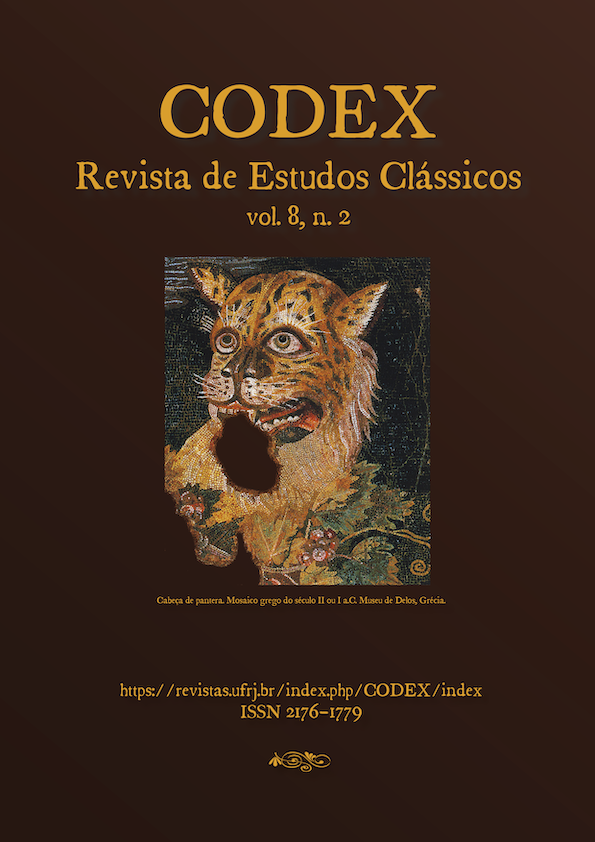Chaerefon, Socrate’s craziest friend
DOI:
https://doi.org/10.25187/codex.v8i2.38601Keywords:
Chaerefon, oracle, dialogue, Socrates, manikósAbstract
This paper presents an analysis of the binding elements between the characters Socrates and Chaerephon in what concerns the dialogical-philosophical praxis both in the Apology and Charmides. I intend to show that Chaerophon must be considered as playing a fundamental role in Socrates’ establishment of the dialogue as the very essence of his philosophy to the extent that the consultation of the Delphi oracle that Chaerephon realized was the starting point to the Socratic investigation as envisaged in the Dialogues. Unlike other followers, Chaerephon is a character that dedicates himself to philosophy somewhat independently from his friend. From this point of view, he is not inferior to Socrates as he can carry out his way of thinking. Hence, considering both Chaerephon and Socrates as philosophers opens up an understanding regarding the Socratic dialogue as a pedagogical-philosophical tool designed to those who, unlike the former, are not able to philosophize by themselves.
References
GOLDSCHMIDT, V. Tempo histórico e tempo lógico na interpretação dos sistemas filosóficos. In: A religião de Platão. São Paulo: Difusão Européia do Livro, 1963, pp. 139-147.
MOORE, C. Chaerephon the Socratic. Phoenix, vol. 67, n. 3/4, 2013, pp. 284-300.
PLATÃO. Apologia. Tradução de Carlos Alberto Nunes. Belém: Editora da Universidade Federal do Pará, 2015.
PLATÃO. A República. Tradução: Anna Lia Amaral de Almeida Prado. São Paulo: Martins Fontes, 2006.
PLATÃO. Cármides. Tradução de Carlos Alberto Nunes. Belém: Editora da Universidade Federal do Pará, 2015.
PLATÃO. Fedro. Tradução de Carlos Alberto Nunes. Belém: Editora da Universidade Federal do Pará, 2011.
PLATÃO. Górgias. Tradução, ensaio introdutório e notas de Daniel R. N. Lopes. São Paulo: Perspectiva, 2011.
PLATO. Phaedrus. A commentary for greek readers by Paul Ryan. Norman: University of Oklahoma Press, 2012.
PLATO. Phaedrus. Edit by Harvey Yunis. Cambridge: Cambridge University Press, 2011.
XENOPHON. The Apology of Socrates. Edited by Nicholas Denyer. Cambridge: Cambridge University Press, 2019.
Downloads
Published
How to Cite
Issue
Section
License
This work is licensed under a Creative Commons Attribution-NonCommercial 4.0 International License.










